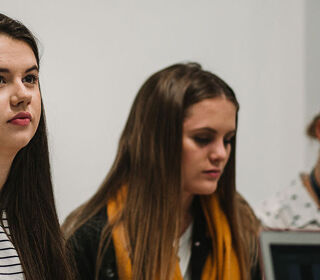
Blog

Sometimes the path to a PhD can be unexpected. For Hannah Harvey, the initial decision to become a speech and language therapist was upturned when participating in an undergraduate research project gave her a passion for research. Now, she’s carrying out important work that aims to identify the terminology that clinicians use when giving children a diagnosis. Below, she shares her journey and provides some tips for future postgraduate researchers.
Your research can impact your profession
A PhD gives you the chance to solve problems, make changes and interact with a variety of individuals in your field. Hannah’s work aims to identify and gain an understanding of the terminology speech and language therapists (SLT) use when referring to clients, but through the course of her research, she found the issues were broader than she originally thought. “I’ve realised the focus needed to shift from just the terminology in use to the act of diagnosis in practice. SLT sits in a really interesting nest between education and health, and traditionally they have different views of approaching diagnosis, bordering on medical and social. So I’m trying to understand that dynamic and see how it influences their work with clients.”
The chance to network with professionals
Attempting to address issues within your field helps expand your professional network. Hannah’s research has gained interest from the professional body, the Royal College of Speech and Language Therapy (RCSLT), which she considers one of the high points of her research. “RCSLT were really interested in my data and results. Every time somebody says that my research is really important and necessary it’s an amazing feeling, especially when it’s coming from a clinician I’m working with. It reminds you why you do what you do!” Positive feedback like this is also a great motivator, Hannah explains, and helps you through some of the tougher times in the PhD. “Every time I move on to a new aspect of my research it comes with a host of new challenges.”
The clinicians Hannah has already worked with to collect data will be important contacts throughout her project to help share her research findings with the community.
Hannah’s top tip for postgraduate researchers
Your work is really important and it will take a lot of time and effort, but it’s important to take care of yourself. “Take a break!” Hannah recommends. “Don’t be afraid to take time off – it’s really important. The worst thing that can happen to a project is that you start highly motivated and then burn out, which makes you fall out of love with the project. Talk to people. Take breaks. Look after yourself. Do yoga and eat cake if that’s what you like!”
Every PhD is different, but if you want to make an original contribution to your profession, a PhD is the way to go! View our courses here. Remember, you can get the best of both worlds by doing your PhD part-time!
